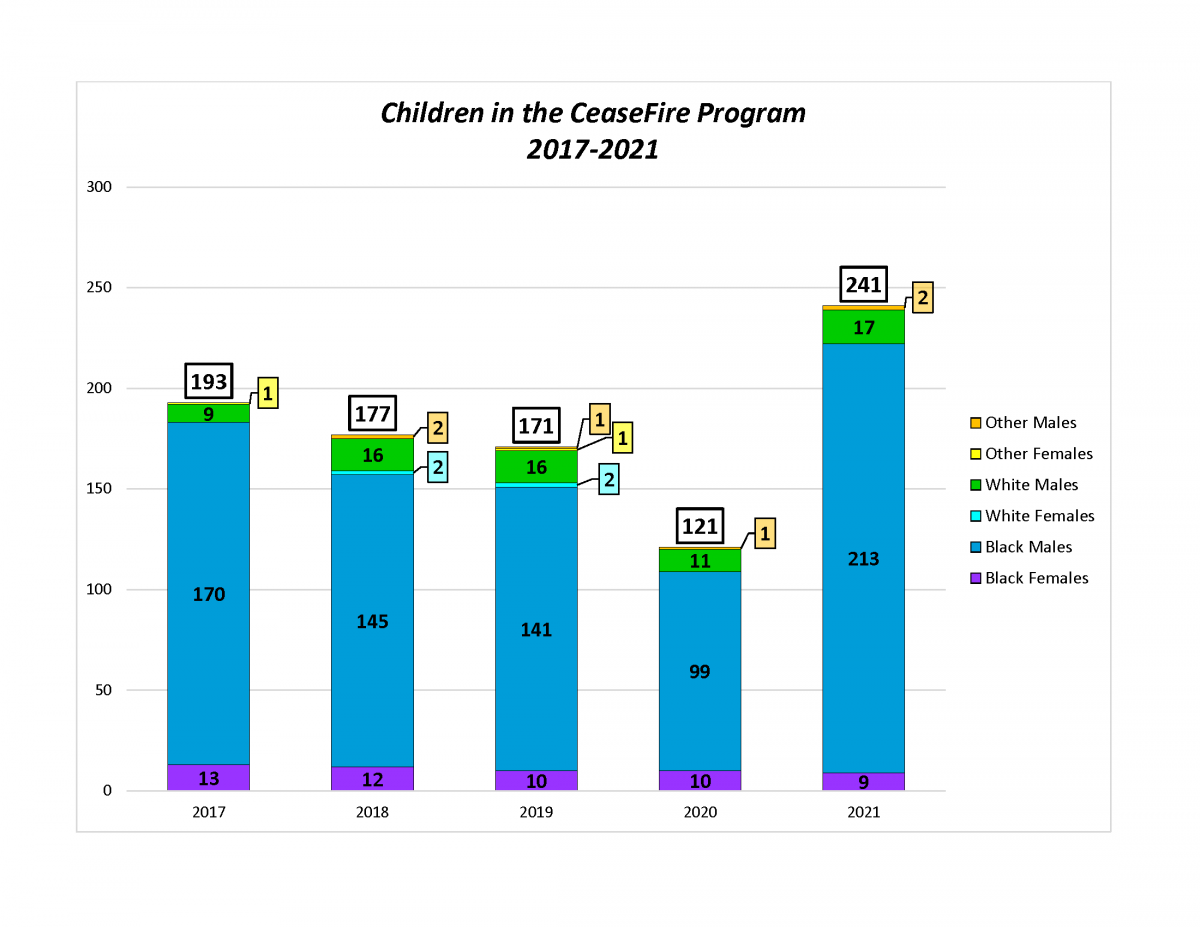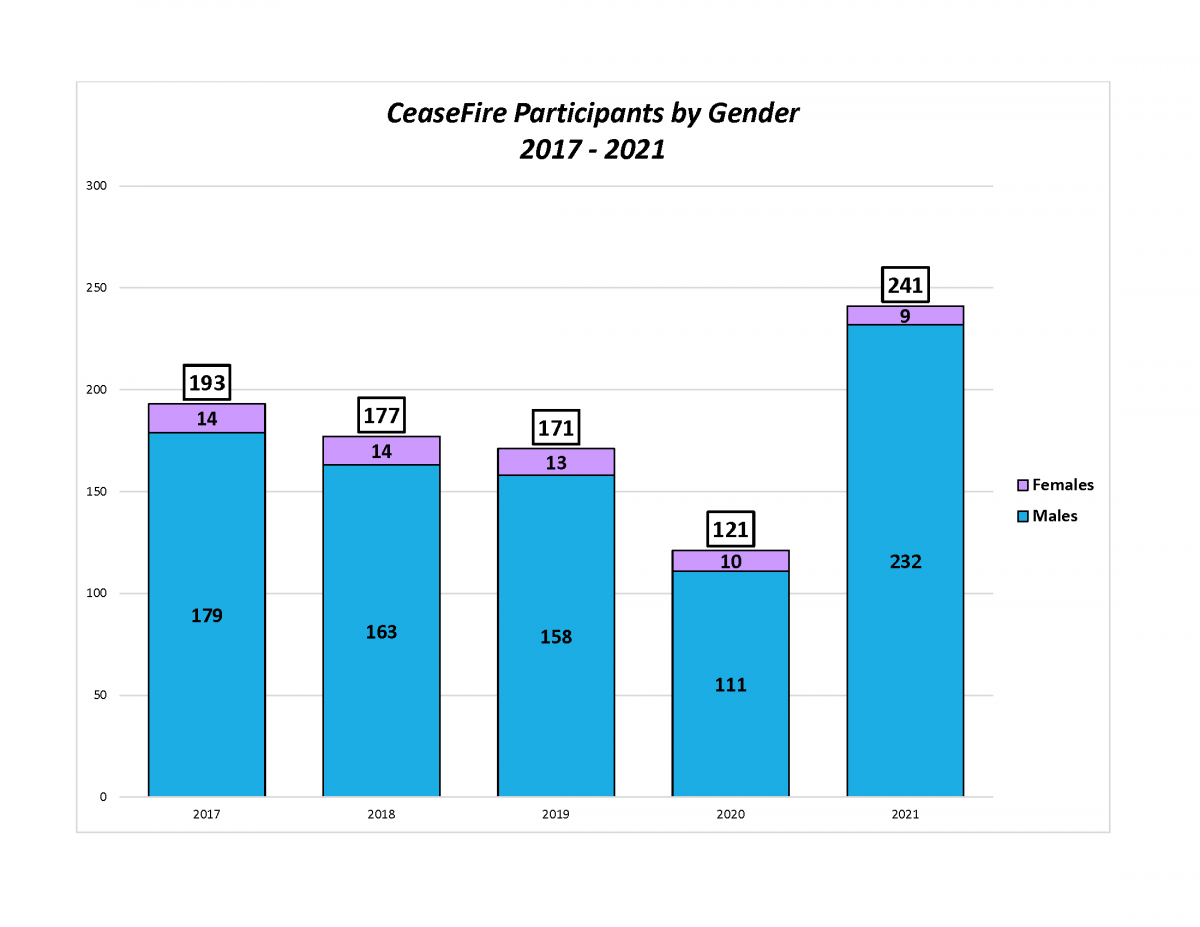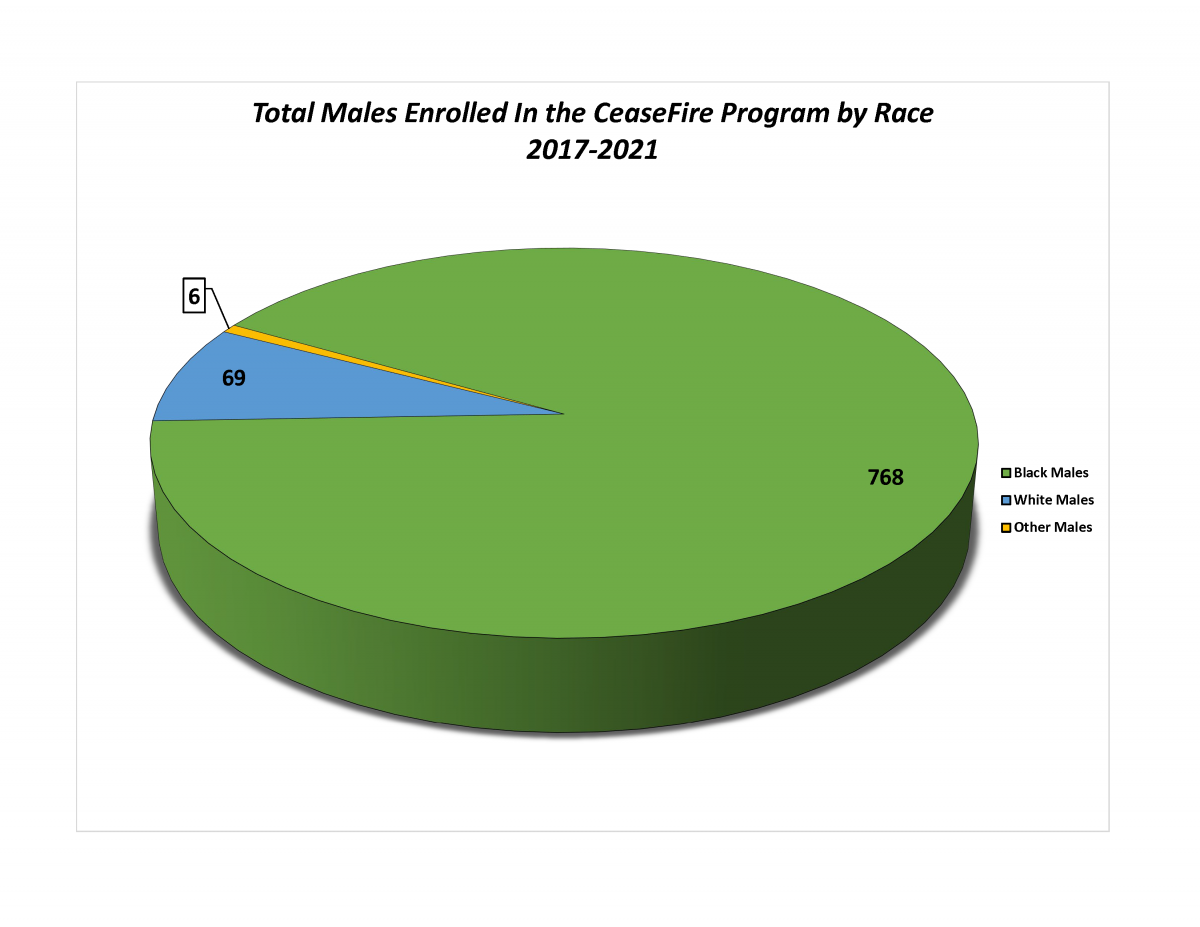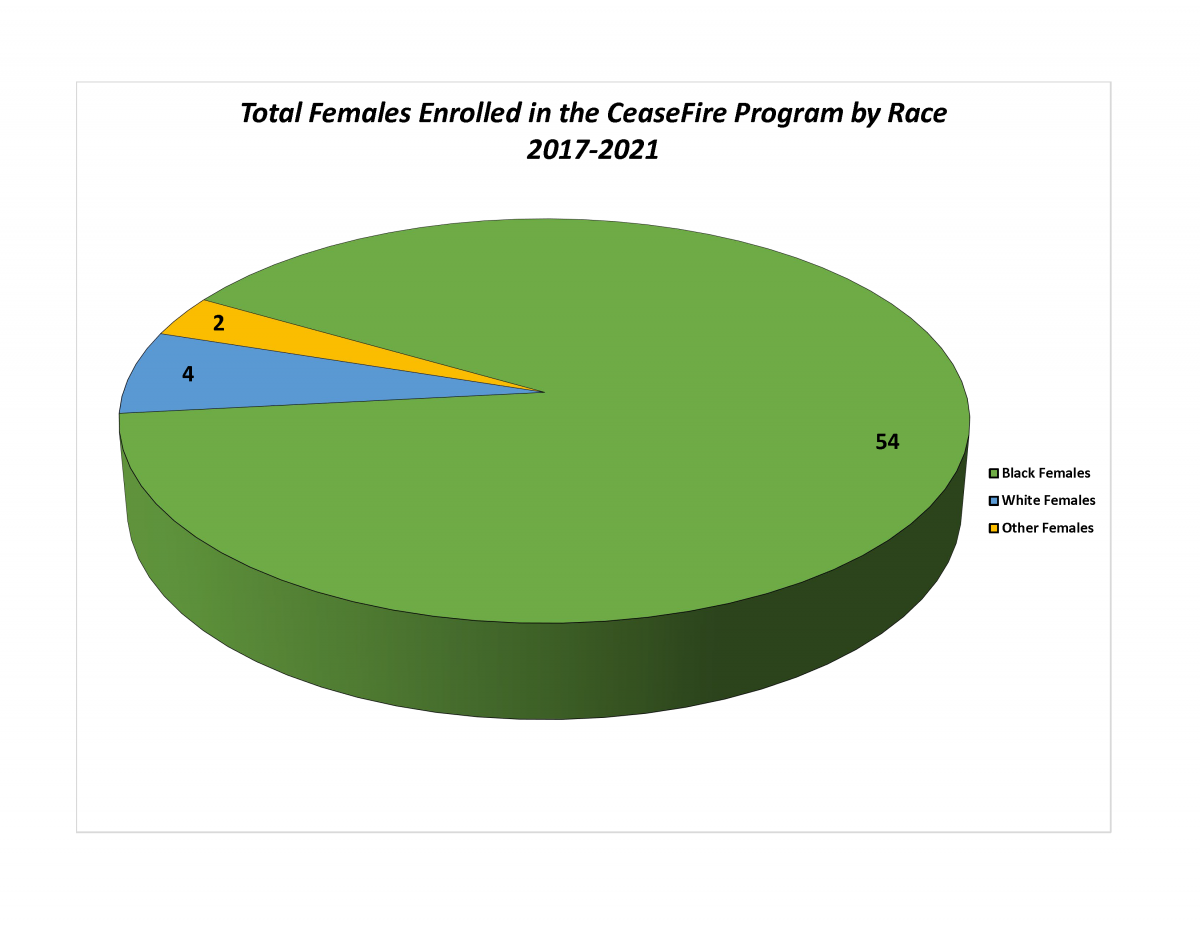The Summons Review Program (SRP) is an innovative diversionary program for first time misdemeanor offenders. The purpose of the SRP is to ensure that all children are afforded the same rehabilitative opportunities to decrease disproportionate minority contact by reviewing summonses prior to processing through the Juvenile Justice System while offering services and assistance to families as needed. Since its creation in 2017 through the end of 2021, the SRP has had 7,588 children participate. One of the hallmarks of success for a program looks at recidivism, or reoffending, rates. Recidivism is calculated by examining data for a period of one year after the child’s original offense and seeing if there have been any other delinquent charges against the child during that time period. The average recidivism rate for this program over the past several years is 11.5%, which indicates that 88.5% of the children who have participated in this program have not had any further delinquent contact with the court.
Summons Review Program Graphs
Spotlight on Gun Crime in Memphis and through the USA
The year 2021 is the second year in a row that Memphis has broken its homicide record (https://wreg.com/news/local/memphis-breaks-homicide-record-for-2nd-year-in-a-row/?ipid=promo-link-block1). The Commercial Appeal stated, “Memphis Police Chief C.J. Davis, like her predecessor, has pointed to the ease of gun access as a driver of gun violence. By September 2021, more than 2,300 guns had been stolen out of vehicles” (https://www.commercialappeal.com/story/news/2022/01/04/homicide-levels-memphis-2021-and-why-there-so-much-death/9054169002/).
In 2021, there were 1,362 juvenile incidents in which some type of gun was used. This is 30% increase from 2020. Tennessee statute requires detention of children charged with unlawful possession of a handgun or carrying of a weapon (TN Code 37-1-114) which resulted in the detention of over 50% of the children detained in 2021. The following graphs represent the two statistics above as well as data from the Memphis Police Department regarding violent crime incidents over the last three (3) years. The last graph provides a look at the number of children killed or injured by gun violence in the United States (information provided from gunviolencearchive.org).
Juvenile Court introduced the CeaseFire program in 2016 as one way of handling juvenile gun crime. The next Spotlight published will include information regarding the CeaseFire program.
Spotlight on Juvenile Court’s “CeaseFire” program
The U.S. Attorney’s Office, in collaboration with Shelby County Juvenile Court, Tennessee Department of Correction, and Memphis Police Department’s Project Safe Neighborhood Task Force sponsor the CeaseFire program at Juvenile Court. CeaseFire was created as an alternative to juvenile detention and as a prevention strategy as a means to reduce gang violence, illegal gun possession and gun violence in Memphis and Shelby County. This program gives youth who have pending gun charges the opportunity to attend a class designed to prevent and deter youth from committing further violent crimes as well as prevent the juvenile from going deeper into the judicial system.
Representatives from federal, state and local law enforcement agencies as well as community organizations speak to the class on topics such as positive decision-making techniques, statistical research on gun violence and potential barriers and penalties these juveniles could face if they continue to unlawfully possess firearms and indulge in a criminal lifestyle. Completion of the course along with other conditions may expunge the charge from their record.
As the previous Spotlight showed, gun crime had increased by 30% from 2020 to 2021. The following graphs represent the demographics of the children involved in the CeaseFire program from 2017 – 2021.




Spotlight on the Youth Services Bureau
The mission of the Youth Services Bureau (YSB) is to develop, manage and supervise community-based programs for youth in Shelby County who require supervision by the Court. The goals of the Youth Services Bureau are to correct, re-educate, redirect, and habilitate delinquent youth who come before the Court. The Bureau received 180 referrals in 2021.
All children placed on YSB probation reside in the home of their parent or guardian and are monitored by YSB Juvenile Service Counselor II. YSB uses a strength-based individual placement plan and assessment chart as well as a Community Risk Assessment to determine which program best benefits the youth. The child is then placed on one of two levels of supervision: Case Management (CM) or Intensive Case Management (ICM). Supervision of children on CM include weekly phone calls with their Case Manager, monthly office visits and possible GPS ankle monitoring. Assessments are conducted to evaluate which services the youth would benefit the most from and referrals are made, with follow-up care coordinated and monitored by the Counselor. Children on ICM receive all the services above with the exception that all of these children are on GPS monitoring for a minimum of 45 days. These children receive visits from YSB Counselors at their homes and within their communities, including the child’s school, place of employment, and any referral sources.
The Youth Service Bureau continues collaborative efforts with community-based initiatives such as Juvenile Intervention and Faith Based Follow-Up (JIFF) program, the School Based Probation Liaison Initiative and the Evening Reporting Center (ERC).
Finally, the Pre-Release Graduation class encourages youth that have successfully completed their court ordered monitoring to remain out of the criminal justice system.
Spotlight of Transfers
In some cases, due to certain circumstances of the offense, the District Attorney’s office may file a “Notice of Transfer”, which means that the prosecution is seeking to transfer a criminal case against a juvenile to Criminal Court. This means the prosecution is seeking to move the case out of Juvenile Court and in to Adult Court, where the child would be charged and/or sentenced the same as an adult who had committed the same offense.
Once a Notice of Transfer is filed, the Court must have a Transfer Hearing. This hearing can result in one of three possible resolutions: Notice of Transfer Denied, Notice of Transfer Withdrawn, or Notice of Transfer Granted.
If, after a hearing, a Notice of Transfer is denied, it indicates that the Juvenile Court Judge has denied the prosecution’s request to transfer the child to Criminal Court and Juvenile Court will retain jurisdiction of the case. If a Notice of Transfer is withdrawn, it indicates that the prosecution and the defense attorney have reached a resolution in which Juvenile Court will retain jurisdiction of the case, and the Notice of Transfer is no longer needed.
In order for the Court to grant a transfer,
"the court must find reasonable grounds to believe that (i) the child committed the delinquent act as alleged, (ii) the child is not committable to an institution for the intellectually disabled or mentally ill, and (iii) the interests of the community require that the child be put under legal restraint or discipline" (https://www.tncourts.gov/rules/rules-juvenile-procedure/208).
If these three prongs are established, then the transfer will be granted and the case will be moved to Criminal Court.
As evidenced in the graphs below, since 2017, there have been a 40.7 % decrease in the number of Notices filed and a 56.5% decrease in the number of transfers granted.
SPOTLIGHT ON YOUTH COURT
Youth Court is a juvenile delinquency diversion and peer restorative justice program dedicated to rehabilitation of first-time nonviolent offenders. The program holds the children who commit delinquent acts accountable for their behavior and teaches them about social responsibility. Local attorneys and law students from the University of Memphis guide the student team members in their roles as Prosecutors, Defense Counsel, Jurors and Court Officers.
This program is a volunteer-driven and youth-led diversion program, not a formal court hearing. In the Youth Court Program, a youth who has admitted culpability appears for a sentencing hearing before a jury of peers. The Youth Court volunteers are drawn from local high school students. While being mentored by licensed practicing attorneys, youth volunteers fulfill roles as, prosecutors, defenders, bailiffs, jury forepersons and jurors and have completed twelve to fifteen hours of program training. The Youth Court Program strives to promote feelings of positive self-esteem, a desire for self-improvement, and foster a healthy attitude toward community, rules and authority. The goal of Youth Court is to use positive peer pressure to ensure that young people who have committed minor offenses repair the damage they cause to their victims, families and our community. Youth volunteers are credited with community service hours, as well as receive ongoing intensive development and team building activities which cultivate their leadership skills.
